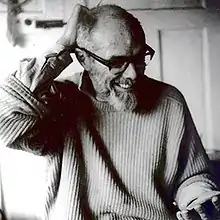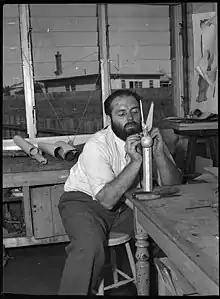Paul Beadle
Paul John Beadle (25 November 1917 – 28 December 1992) was a New Zealand sculptor and medallist.
Paul Beadle | |
|---|---|
 Paul Beadle | |
| Born | 25 November 1917 Hungerford, Berkshire, UK |
| Died | 28 December 1992 (aged 75) Auckland, New Zealand |
| Known for | Sculptor, medallist |
Early life and training
Born in Hungerford, Berkshire, England in 1917, Beadle studied cabinetmaking and building construction at Cambridge Art School for two years before going on to the London County Council Central School of Arts and Crafts.[1] He also studied privately under sculptor and carver Alfred Southwick.[1] He went on to Copenhagen to study in the studio of Kurt Harald Eisenstein, where his classicist style and leanings began to develop.[1]
World War II
When World War II began, Beadle enlisted in the Royal Navy and served with the Home Fleet, Mediterranean Fleet and the Pacific Fleet until 1943.[1] In 1944 he travelled to Australia as a submariner-artist and stayed there once the war ended working for Australian newspapers and taking up teaching.[1]
Career
In 1950 he became a foundation member of the Society of Sculptors and Associates in Sydney. For six years from 1951, he was the head of the Art School at Newcastle Technical College. He was Principal of the South Australian School of Art 1958–1960[2] and president of the Royal South Australian Society of Arts 1958–1959.

In 1953–1954 he created the stylised American eagle perched upon a bronze sphere surmounting the octagonal tapered column of the Australian–American Memorial in Canberra.[3]
In 1961 he moved to Auckland to become Professor of Fine Arts at the University of Auckland.[1] Between 1961 and 1975 he was also the Dean of Elam School of Art.[4] He was the foundation president of the New Zealand Society of Sculptors and Associates in Auckland in 1962. He was also a Fellow of the Royal South Australian Society of Arts and the President of the New Zealand Society of Industrial Designers (NZSID).[1]
Beadle's sculptural work drew upon influences from the Hallstatt Culture of the early Iron Age, West African Ashanti bronzes and combined these with references to life in modern New Zealand.[5] According to art historian Mark Stocker, Beadle was "New Zealand's foremost internationally recognised medal maker."[5]
Recognition
Beadle has exhibited with the New Zealand art association The Group and the New Zealand Academy of Fine Arts.[6] His work is included in the collections of the Auckland Art Gallery Toi o Tāmaki, Museum of New Zealand Te Papa Tongarewa, the Australian National Gallery and the state galleries of Sydney, Perth and Adelaide.[7][8][9] University of Auckland offers the Paul Beadle Scholarship[10] annually for postgraduate students at Elam School of Art.
References
- Cape, Peter (1969). Artists and Craftsmen in New Zealand. Auckland; London: Collins. pp. 95–99.
- McCulloch, Alan (1968). Encyclopedia of Australian Art. London: Hutchinson. ISBN 0090814207.
- "Australian-American Memorial". Monument Australia. Retrieved 28 June 2022.
- "Paul Beadle" (PDF). International Art Centre. Archived from the original (PDF) on 26 January 2015. Retrieved 9 December 2014.
- Stocker, Mark. "Sculpture and Installation Art — Early Modern Sculpture". Te Ara – The Encyclopedia of New Zealand. Retrieved 9 December 2014.
- "Beadle, Paul". Find NZ Artists. Retrieved 9 December 2014.
- "Paul Beadle". Auckland Art Gallery Toi o Tāmaki. Archived from the original on 23 September 2015. Retrieved 9 December 2014.
- "Object: Silver Medal". Museum of New Zealand Te Papa Tongarewa. Retrieved 9 December 2014.
- "Paul John Beadle". Australian Art Auction Records. Retrieved 9 December 2014.
- "Paul Beadle Scholarship — The University of Auckland". www.auckland.ac.nz. Retrieved 11 December 2020.